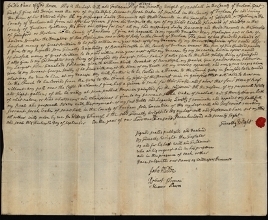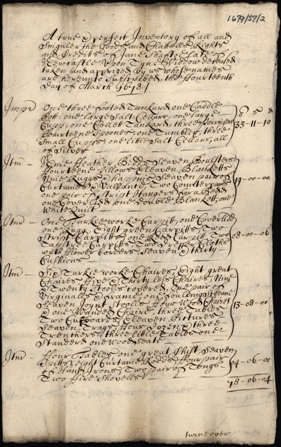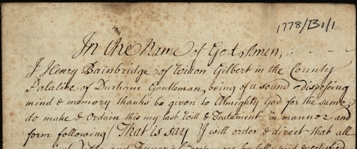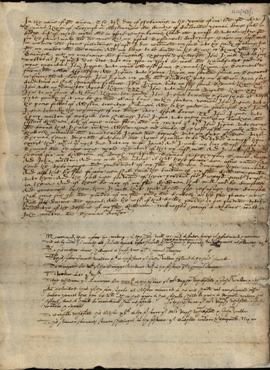Family History and Wills
Will of Timothy Wright of Snow Hall in Gainford, gentleman

By his 1778 will he leaves Snow Hall to his housekeeper Sarah Wake and makes her his executor. After her death the property is to pass to Wright's friend Richard Sherwood, an apothecary of Staindrop. Some kindred do emerge from the document: a reputed son and daughter in Barnard Castle and London each receive a generous £200 legacy. His servant George Soulby is left his clothes and a year's wages. A Spanish gun and powder horn are also listed among the bequests - perhaps booty from a foreign military adventure, for another will in the collection reports he had served in General Bland's Dragoons during the Jacobite Rising of 1745. His pallbearers were each to receive half a guinea 'for his trouble' and 'four stone of beef and eight gallons of ale [to] be ready for them at some publick house in Gainford'. Wright's servant Soulby married the housekeeper within the year, and was still resident at the hall in the 1790s, now having risen to the status of a gentleman. Some family histories can become as much a history of the home as the family, and this will has led to some fine drawings of Snow Hall held in a Durham County Record Office collection.
Ref: DPRI/1/1778/W12/1-2.
Inventory of Jane Shaftoe of Newcastle upon Tyne, widow

These extracts from the three-page room-by-room inventory of the goods and chattels of the late Jane Shafto, probably the widow of a merchant, bear witness to a life lived in some pomp and style. Her goods include 'Nine Feather Bedds … One Turkie worke Carpitt … seaven & thirty Cushions … Six Turkey worke Chaires, Eight great Chaires, Five & Thirty less Chaires … one pair of Virginalls … Eleavan Pictures …'. In her cellar are 128 gallons of 'Canary [wine]', 292 gallons of 'Decayed Claritt', 183 gallons of 'reasonable good Clarett', 43 gallons of white wine, four gallons of 'Wormewood [used to brew ale or medicinally or added to cordials]', 46 gallons of 'Tent [Spanish wine]', eight gallons of 'Shery'and 54 gallons of 'Rennish [wine]'.
Ref: DPRI/1/1679/S7/2-5.
Will of Henry Bainbridge of Witton Gilbert, gentleman

Children were expected to make suitable marriages, and when Bainbridge made his will on 10 July 1772 he added an instruction as an after thought that 'none of my three Children shall marry into any mean low familys, but into such Creditable substantiall families whose <circumstances> are such as to be able to give their Children equal or better fortunes than their own'. Any child disobeying this edict was to be disinherited. But occasionally the husband of a substantial heiress might consent to be disinherited by his family as a form of estate planning. The probate collection contains many examples of suspicious and sometimes furious fathers casting a jaundiced eye on their children's romantic adventures, and among the Durham collections is a Gretna Green marriage register and the will of the Newcastle banker Aubone Surtees. Four months after Bainbridge made his will Surtees' daughter Bessie was helped out of a first floor window on Sandhill by a hoastman's son named John Scott, who would go on to occupy the not insignificant office of Lord High Chancellor of Great Britain and Ireland
Ref: DPRI/1/1778/B1/1.
Will and Account of the execution of the will of Thomas Nixon of Leehouse and Eshgillside in Alston

Some twelve years passed between the probate of Nixon's will and the passing of his account: his children were still minors when he died, and their guardianship passed to four friends also named as supervisors in the will. The account, entered by one of these 'executors in trust', was probably drawn up when the eldest sons, the executors, came of age. The disbursements in the account faithfully follow Nixon's testamentary instructions and add two names to the fifteen found in the will; sadly the twenty-six of his brothers' and sisters' children (on his and his wife's side) who each received 2s 6d are not named. The account also provides a total value of £541 11s 7d for the now missing inventory. Wills and their associated probate records can be excellent genealogical resources. Before the 19th century, however, note that the term 'brother' for example was often used to describe one's brother-in-law, and 'cousin' might take in some very distant relations indeed. It was often essential nevertheless that the true nature of such kin relationships was established by the probate court for the purposes of distributing intestate's estates. For much of this period a person's kin was a valuable source of mutual support, but sometimes also a curse: in parts of the border marches where family feuding was rife, merely the fact of bearing a surname could be a death sentence.
Ref: DPRI/1/1612/N3/1; DPRI/1/1625/N1/1-2.


